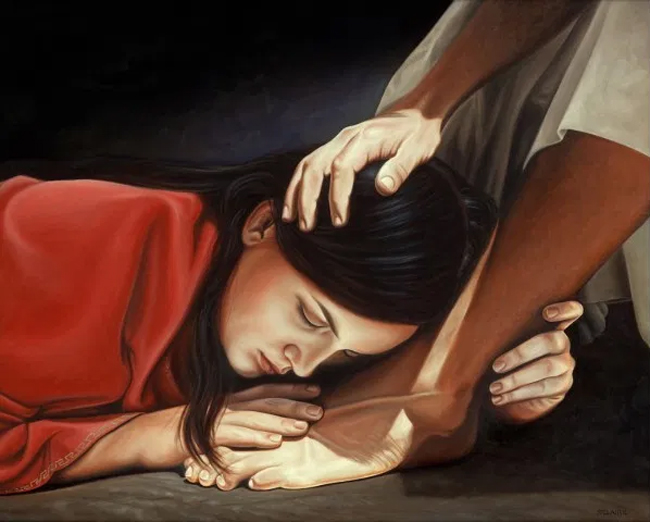Christian Art | Mary Anoints Jesus At Bethany
The Gospel Of Saint John – Chapter 12 | Audio King James Version Bible | KJV
1 THEN Jesus six days before the Passover came to Bethany, where Lazarus was which had been dead, whom he raised from the dead.
2 There they made him a supper; and Martha served: but Lazarus was one of them that sat at the table with him.
3 Then took Mary a pound of ointment of spikenard, very costly, and anointed the feet of Jesus, and wiped his feet with her hair: and the house was filled with the odour of the ointment.
4 Then saith one of his disciples, Judas Iscariot, Simon’s son, which should betray him,
5 Why was not this ointment sold for three hundred pence, and given to the poor?
6 This he said, not that he cared for the poor; but because he was a thief, and had the bag, and bare what was put therein.
7 Then said Jesus, Let her alone: against the day of my burying hath she kept this.
8 For the poor always ye have with you; but me ye have not always.
9 Much people of the Jews therefore knew that he was there: and they came not for Jesus’ sake only, but that they might see Lazarus also, whom he had raised from the dead.
10 ¶ But the chief priests consulted that they might put Lazarus also to death;
11 Because that by reason of him many of the Jews went away, and believed on Jesus.
We have entered into Holy Week. In this reading of the Bible, Jesus prepares for his triumphal entry into Jerusalem. For now he has had to hide himself from the Jewish authorities. His preaching and miracles over the course of the previous eleven books of John (the Book of the Signs) has increasingly aroused the hatred of the Sanhedrin, the Jewish council, and they are determined to kill him. Jesus has retreated to the home of friends. Despite the danger, Martha, Mary and Lazarus wish to show him their friendship and hospitality. They share a meal. The love they show to Jesus is in marked contrast with the hatred of the scribes and the Pharisees and the betrayal by Judas.
As we have heard in our Palm Sunday reading, Mary anoints Jesus. In John’s account, she anoints Jesus’ feet and wipes them with her hair. This is a sign of great love and humility, which Jesus will offer to his followers in John’s account of the Last Supper. The ointment she uses is very precious, costing a year’s wages for a labouring man, and the whole house is filled with the beautiful scent.
We learn in these verses of John’s Gospel that Judas is a thief and a hypocrite prior to his ultimate betrayal of Jesus. He objects to using the ointment to anoint Jesus, when it could have been sold and given to the poor. This is outright hypocrisy. He does not care for Jesus. Rather, Judas is the person in charge of Jesus’ and the disciples’ money and he has stolen from the communal funds. Satan has long since entered into Judas’ heart.
Jesus replies by recognising Mary’s love and also by anticipating the Easter events of the passion, crucifixion, death and resurrection. It will be, he says, for Mary to show tenderness for our Lord’s crucified body by anointing him. He adds: ‘For the poor always ye have with you.’
This in no wise means that Jesus does not care for the poor. Rather he is quoting a verse from Deuteronomy (15: 11), with which all the people present and of Bible times would have been familiar. The verse reads: ‘For the poor shall never cease out of the land: therefore I command thee, saying, Thou shalt open thine hand wide unto thy brother, to thy poor, and to thy needy, in thy land.’ Jesus is, in fact, teaching us always to show mercy, love and charity to the poor.
The crowd now hear where Jesus is and flock to see him and also Lazarus, whom Jesus has raised from the dead. Perhaps they came through an initial spark of faith, perhaps more through superficial curiosity and short-lived enthusiasm.
Such is the perverse and self-seeking thinking of the chief priests, that now Lazarus is also in danger, because he serves as a living testimony to Jesus the Son of God.
‘What a shining piece of magnanimity is this “extravagance” on Mary’s part! Judas, on the other hand, laments this “waste” of so valuable a perfume; in his greed he had been calculating the price: it would have fetched at least “three hundred silver pieces”.
‘True detachment leads us to be very generous with God and with our fellow-men… Don’t be mean and grudging with people who, without counting the cost, have given of their all, everything they have, for your sake. Just ask yourselves, how much does it cost you – in financial terms as well – to be Christians? Above all, don’t forget that “God loves a cheerful giver” (2 Corinthians 9:7).’ St Josemaria Escriva








